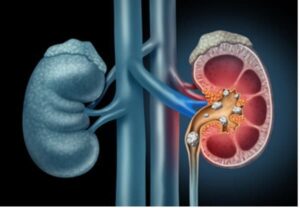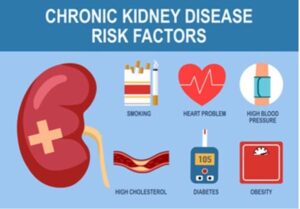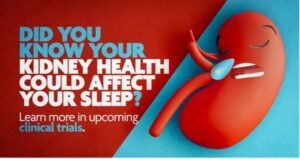Did you know that kidney disease is one of the leading causes of death in the United States? It kills more people annually than breast or prostate cancer. This is largely due to the fact that kidney disease often doesn’t display symptoms until it’s too late. Kidney disease is a silent killer with loud repercussions, read our latest blog and familiarize yourself with the risk factors for kidney disease!
Don’t Kid About your Kidney
Our kidneys are the superheroes of our body, saving the day, and often under-appreciated for all their work. The kidneys are responsible for filtering out toxins and waste products from the blood. They also help to regulate blood pressure and balance electrolytes in the body. Making multitasking look easy with over 500 tasks being performed to keep us healthy. However, when the kidneys aren’t functioning properly, it can lead to a variety of health problems including anemia, diabetes, heart disease, hypertension, and kidney disease.

Am I At Risk for Kidney Disease?
To help prevent kidney disease, it’s important to be aware of the risk factors, some of the most common include:
- Age: The risk of kidney disease increases as you get older, with 38% of chronic kidney disease patients being 65 years or older.
- Diabetes: Individuals with diabetes are at higher risk for developing kidney disease. Diabetes is one of the leading causes of kidney disease. When someone has diabetes, their blood sugar levels can become too high and cause damage to the blood vessels in their kidneys. This damage can lead to a decrease in how well these vital organs are able to filter waste from the blood. Overtime this can potentially lead to kidney failure.
- Ethnicity: Certain ethnic groups, such as Hispanics, are more likely to be affected by kidney disease. The mortality rate for kidney disease in Hispanic people in the U.S. is almost 50% higher than non-Hispanic whites.
- Family history: Family history plays a significant role in the development of various forms of kidney disease. From inherited disorders such as polycystic kidney disease to lifestyle factors like high blood pressure or diabetes, our genes and family habits can greatly impact our renal health.
- High blood pressure: Hypertension also known as high blood pressure, is a leading cause of kidney failure. High blood pressure can cause kidneys to work overtime and as a result becoming damaged and unable to function properly.

How to be Kind to your Kidney
There are many things you can do to help prevent kidney disease. One of the most important ways to reduce your risk of developing kidney disease is to maintain healthy blood pressure. Equally as important is controlling your blood sugar if you have diabetes, as is exercising regularly and eating a healthy diet. You should also limit your salt intake and quit smoking. Lastly, if you think you might be at risk for kidney disease, consider enrolling in one of our upcoming kidney studies. Participation is confidential and there is no cost to participate. Kidney disease is a silent killer with loud repercussions, don’t let it catch you by surprise!

There’s no need to worry about kidney health! We have upcoming studies for kidney studies, if you’re interested, visit our website or call us at (210) 949 – 0807 for more information. We would be happy to answer any questions you have because your kidney is no kidneying matter!
Resources:
https://www.kidneyfund.org/all-about-kidneys/risk-factors
https://www.cdc.gov/kidneydisease/prevention-risk.html





